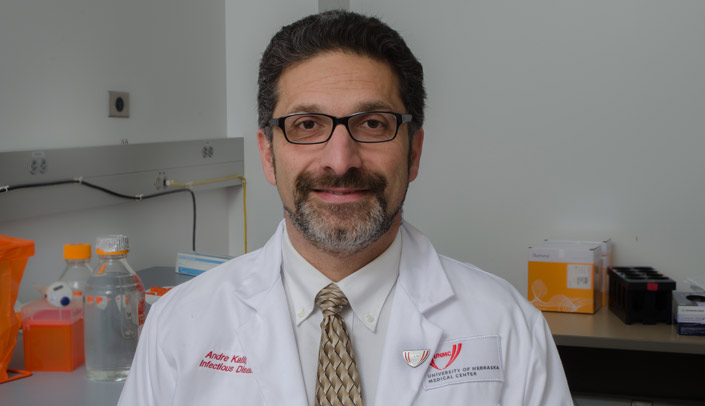For years, Andre Kalil, M.D., observed with awe how solid organ transplant patients who acquired sepsis, a potentially life-threatening infection, would get well.
Considering that transplant patients need to take lifelong medications to lower their immune system in order to avoid rejection, this was surprising to him.
“They would be really sick and amazingly come back in a way that you would not expect,” said Dr. Kalil, professor of infectious diseases at UNMC.
The phenomenon so intrigued him that he decided to conduct a more formal study.
The results appear in the January 2015 issue of Clinical Infectious Diseases, a journal published by Oxford University Press on behalf of the Infectious Diseases Society of America.
View the study here.
From 2008 to 2012, Dr. Kalil and eight UNMC colleagues compared organ transplant patients admitted to Nebraska Medicine, UNMC’s primary clinical partner, to non-transplant patients admitted to the same unit.
A total of 369 patients, with an average age of 51, were studied. Each patient with blood culture-proven sepsis was followed on the hypothesis that transplant recipients who develop sepsis would have worse short- and long-term survival than non-transplant patients.
But that’s not what happened.
In fact, the non-transplant patients actually did worse.
Dr. Kalil and his colleagues determined that the immunosuppression associated with organ transplantation might provide a survival advantage to transplant recipients with sepsis through modulation of the inflammatory response.
“You would think that being immunosuppressed would be a detriment to the transplant patient, but in this case it may help,” Dr. Kalil said.
Likewise, in the non-transplant patients who did worse, the immune response was so intense that the body was fighting against itself, he said.
“It’s a very fine line of understanding how much immune response is too much or too little,” Dr. Kalil said.
Sepsis, which affects close to one million people a year in the U.S., killing a third of those patients, is caused by such problems as pneumonia, urinary tract infections, and abdominal or skin infections and is usually treated by conventional antibiotics.
Dr. Kalil and his colleagues are planning to apply for a grant to do a larger multi-transplant center study to further understand the role immunosuppression plays in regulating the immune system in a person with sepsis infection.
“It’s a very novel finding but one that begets more questions,” Dr. Kalil said. “Our findings have direct public health implications for not just the organ transplantation community but every patient affected by this deadly infection.”

Always the scientist. It is never the "wrong answer"!